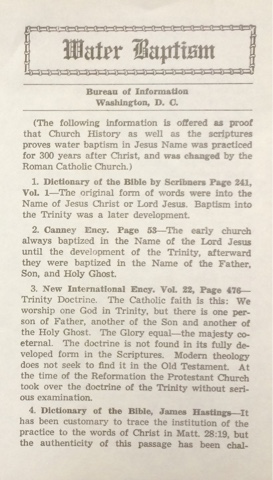“The value of truth is never diminished because of repetition.” -Harold Hoffman
Tag: water baptism
An Unexpected Revelation
Text: John 4:4, “And he must needs go through Samaria.”
This event in the chronology of Jesus occurs in the first year of His ministry, and He has already upended the religious practices and expectations of his day:
- He was baptized by John. <Unexpected = Behold, the Lamb of…>
- The Spirit drove Him into the wilderness for a time of fasting and temptation. <Unexpected = Seal of approval on Him, still tempted>
- He chose five of His twelve disciples: John, Andrew, Simon (Cephas), Philip and Nathanael. <Unexpected = name change, no guile>
- His first miracle in Cana of Galilee where He turned the water into wine (Jn. 2:1-11). <Unexpected = Best for last>
- The First Passover of His earthly ministry occurs, He cleanses the Temple, and He prophesied His death and resurrection:
- John 2:13-22, “(13) And the Jews’ passover was at hand, and Jesus went up to Jerusalem, (14) And found in the temple those that sold oxen and sheep and doves, and the changers of money sitting: (15) And when he had made a scourge of small cords, he drove them all out of the temple, and the sheep, and the oxen; and poured out the changers’ money, and overthrew the tables; (16) And said unto them that sold doves, Take these things hence; make not my Father’s house an house of merchandise. (17) And his disciples remembered that it was written, The zeal of thine house hath eaten me up. (18) Then answered the Jews and said unto him, What sign [what miracle or authority] shewest thou unto us, seeing that thou doest these things? (19) Jesus answered and said unto them, Destroy this temple, and in three days I will raise it up. (20) Then said the Jews, Forty and six years was this temple in building, and wilt thou rear it up in three days? (21) But he spake of the temple of his body. (22) When therefore he was risen from the dead, his disciples remembered that he had said this unto them; and they believed the scripture, and the word which Jesus had said.” <Unexpected = Messiah suddenly comes to His temple, Mal. 3:1>
- He reveals the necessity of being born again to a Jewish leader named Nicodemus: John 3:1-21. <Unexpected = New Birth>
All these Unexpected Events and Revelations occur in a short amount of time at the beginning of Jesus’ earthly ministry
Then He goes through Samaria – He must need go through Samaria.
Here we lift our text and announce the thought:
An Unexpected Revelation
John 4:1-26
(1) When therefore the Lord knew how the Pharisees had heard that Jesus made and baptized more disciples than John,
(2) (Though Jesus himself baptized not, but his disciples,)
(3) He left Judaea, and departed again into Galilee.
(4) And he must needs go through Samaria.
(5) Then cometh he to a city of Samaria, which is called Sychar, near to the parcel of ground that Jacob gave to his son Joseph.
(6) Now Jacob’s well was there. Jesus therefore, being wearied with his journey, sat thus on the well: and it was about the sixth hour.[1]
(7) There cometh a woman of Samaria to draw water: Jesus saith unto her, Give me to drink.
(8) (For his disciples were gone away unto the city to buy meat.)
(9) Then saith the woman of Samaria unto him, How is it that thou, being a Jew, askest drink of me, which am a woman of Samaria? for the Jews have no dealings with the Samaritans.
(10) Jesus answered and said unto her, If thou knewest the gift of God, and who it is that saith to thee, Give me to drink; thou wouldest have asked of him, and he would have given thee living water.
(11) The woman saith unto him, Sir, thou hast nothing to draw with, and the well is deep: from whence then hast thou that living water?
(12) Art thou greater than our father Jacob, which gave us the well, and drank thereof himself, and his children, and his cattle?
(13) Jesus answered and said unto her, Whosoever drinketh of this water shall thirst again:
(14) But whosoever drinketh of the water that I shall give him shall never thirst; but the water that I shall give him shall be in him a well of water springing up into everlasting life.
(15) The woman saith unto him, Sir, give me this water, that I thirst not, neither come hither to draw.
(16) Jesus saith unto her, Go, call thy husband, and come hither.
(17) The woman answered and said, I have no husband. Jesus said unto her, Thou hast well said, I have no husband:
(18) For thou hast had five husbands; and he whom thou now hast is not thy husband: in that saidst thou truly.
(19) The woman saith unto him, Sir, I perceive that thou art a prophet.
(20) Our fathers worshipped in this mountain; and ye say, that in Jerusalem is the place where men ought to worship.
(21) Jesus saith unto her, Woman, believe me, the hour cometh, when ye shall neither in this mountain, nor yet at Jerusalem, worship the Father.
(22) Ye worship ye know not what: we know what we worship: for salvation is of the Jews.
(23) But the hour cometh, and now is, when the true worshippers shall worship the Father in spirit and in truth: for the Father seeketh such to worship him.
(24) God is a Spirit: and they that worship him must worship him in spirit and in truth.
(25) The woman saith unto him, I know that Messias cometh, which is called Christ: when he is come, he will tell us all things.
(26) Jesus saith unto her, I that speak unto thee am he.
Jesus rarely chooses the expected path.
Romans 11:33-36
(33) O the depth of the riches both of the wisdom and knowledge of God! how unsearchable are his judgments, and his ways past finding out!
(34) For who hath known the mind of the Lord? or who hath been his counsellor?
(35) Or who hath first given to him, and it shall be recompensed unto him again?
(36) For of him, and through him, and to him, are all things: to whom be glory for ever. Amen.
[1] Sixth hour = Noon
The Promise
Text: John 14:15-18
(15) If ye love me, keep my commandments.
(16) And I will pray the Father, and he shall give you another Comforter, that he may abide with you for ever;
(17) Even the Spirit of truth; whom the world cannot receive, because it seeth him not, neither knoweth him: but ye know him; for he dwelleth with you, and shall be in you.
(18) I will not leave you comfortless: I will come to you.
Isaiah 55:10-11, “For as the rain cometh down, and the snow from heaven, and returneth not thither, but watereth the earth, and maketh it bring forth and bud, that it may give seed to the sower, and bread to the eater: So shall my word be that goeth forth out of my mouth: it shall not return unto me void, but it shall accomplish that which I please, and it shall prosper in the thing whereto I sent it.”
The Promise[1]
God keeps His promises.
Matthew 16:18, “And I say also unto thee, That thou art Peter, and upon this rock I will build my church; and the gates of hell shall not prevail against it.”
At no time on earth since Acts 2 has there been a moment when there wasn’t a Spirit-filled believer.
God’s Word is forever settled in Heaven and will accomplish its goal. There are generally, two types of promises God makes with man in the Bible:
- Unconditional – The promises to Abraham, Isaac, and Jacob did not depend on any future action on their part because they were unconditional and would come to pass regardless of anything that these men did or didn’t do:
- Genesis 12:1-3 [sevenfold blessing], “(1) Now the LORD had said unto Abram, Get thee out of thy country, and from thy kindred, and from thy father’s house, unto a land that I will shew thee: (2) And I will make of thee a great nation, and I will bless thee, and make thy name great; and thou shalt be a blessing: (3) And I will bless them that bless thee, and curse him that curseth thee: and in thee shall all families of the earth be blessed.
- Genesis 15:13-18, “(13) And he said unto Abram, Know of a surety that thy seed shall be a stranger in a land that is not theirs, and shall serve them; and they shall afflict them four hundred years; (14) And also that nation, whom they shall serve, will I judge: and afterward shall they come out with great substance. (15) And thou shalt go to thy fathers in peace; thou shalt be buried in a good old age. (16) But in the fourth generation they shall come hither again: for the iniquity of the Amorites is not yet full. (17) And it came to pass, that, when the sun went down, and it was dark, behold a smoking furnace, and a burning lamp that passed between those pieces. (18) In the same day the LORD made a covenant with Abram, saying, Unto thy seed have I given this land, from the river of Egypt unto the great river, the river Euphrates:Galatians 3:15-18, “(15) Brethren, I speak after the manner of men; Though it be but a man’s covenant, yet if it be confirmed, no man disannulleth, or addeth thereto. (16) Now to Abraham and his seed were the promises made. He saith not, And to seeds, as of many; but as of one, And to thy seed, which is Christ. (17) And this I say, that the covenant, that was confirmed before of God in Christ, the law, which was four hundred and thirty years after, cannot disannul, that it should make the promise of none effect. (18) For if the inheritance be of the law, it is no more of promise: but God gave it to Abraham by promise.”
- Joel 2:28-29, “And it shall come to pass afterward, that I will pour out my spirit upon all flesh; and your sons and your daughters shall prophesy, your old men shall dream dreams, your young men shall see visions: And also upon the servants and upon the handmaids in those days will I pour out my spirit.”
- Isaiah 28:11-12, “For with stammering lips and another tongue will he speak to this people. To whom he said, This is the rest wherewith ye may cause the weary to rest; and this is the refreshing: yet they would not hear.”
- Conditional – The Bible contains “if…then” statements. These are requirements that you must meet to receive the promise. They represent future acts that must be obeyed to receive the full promise:
- 2 Chronicles 7:14, “If my people, which are called by my name, shall humble themselves, and pray, and seek my face, and turn from their wicked ways; then will I hear from heaven, and will forgive their sin, and will heal their land.
- Acts 2:37-39, “Now when they heard this, they were pricked in their heart, and said unto Peter and to the rest of the apostles, Men and brethren, what shall we do? Then Peter said unto them, Repent, and be baptized every one of you in the name of Jesus Christ for the remission of sins, and ye shall receive the gift of the Holy Ghost. For the promise is unto you, and to your children, and to all that are afar off, even as many as the Lord our God shall call.”
Some ask, “Why Tongues?”[2]
- God is not accountable to us for what He chooses to so. He is Sovereign, Creator, Sustainer, Redeemer, Savior…He is GOD.
- Tongues is an initial external sign that must be followed by the continuing evidence of Fruit of the Spirit.
- Gal. 5:22-23, “…the fruit of the Spirit is love, joy, peace, longsuffering, gentleness, goodness, faith, Meekness, temperance…”
- John 3:8, “The wind bloweth where it listeth, and thou hearest the sound thereof, but canst not tell whence it cometh, and whither it goeth: so is every one that is born of the Spirit.”
- It is the consistent pattern of evidence established by God as essential in the New Birth:
- 1 Corinthians 12:13, “For by one Spirit are we all baptized into one body, whether we be Jews or Gentiles, whether we be bond or free; and have been all made to drink into one Spirit.”
- Acts 2:4, “And they were all filled with the Holy Ghost, and began to speak with other tongues, as the Spirit gave them utterance.”
- Acts 10:46, “For they heard them speak with tongues, and magnify God.”
- Acts 19:6, “And when Paul had laid his hands upon them, the Holy Ghost came on them; and they spake with tongues, and prophesied.”
- 1 Corinthians 12:13, “For by one Spirit are we all baptized into one body, whether we be Jews or Gentiles, whether we be bond or free; and have been all made to drink into one Spirit.”
- The tongue is the most unruly member of the body and when you receive the Holy Ghost speaking in tongues you are allowing God to control the most expressive part of your personality. Man’s expression of emotion, intelligence, and communication is articulated through the tongue.
T. F. Tenney asked, “Why not tongues?”
Virtually the entire third chapter of James is devoted to admonishing the church to beware of that little member that boasts of great things. James goes on to refer to the tongue as a fire, and says that it is capable of defiling the whole body. Did you ever hear of fighting fire with fire? This is exactly what happens when the fire of God’s Spirit enters a man and gains control of his tongue.[3]
James refers to the tongue as the most unruly and hard-to-tame member of the body. Is there any wonder that God has chosen this sign to indicate complete submission to Him. The overpowering blaze of the Holy Spirit neutralizes the burning embers of the carnal tongue. At last the most unruly member of the body is conquered, and the Holy Spirit declares through it in a language known only to God, that Christ has been enthroned in the heart of the believer.[4]
Supernatural? Of course! But when we rob Christianity of its supernatural impetus, we have destroyed its vitality and passion.[5]
Some say, “It’s just for the Apostles and Early Church…”
Irenaeus (died 202): “In like manner we do also hear many brethren in the Church, who possess prophetic gifts, and who through the Spirit speak all kinds of languages, and bring to light for the general benefit the hidden things of men, and declare the mysteries of God.”[6]
Hildegard of Bingen (1098-1179: “sang in unknown words with such facility and winsomeness that her utterances were known as ‘concerts in the Spirit’.”[7]
The Waldenses (c. 1217): these followers of Peter Waldo believed in visions and prophecies.[8] Both healing and speaking in tongues were manifested among these heavily persecuted Christians.[9]
Early Quakers: “We received often the pouring down of the Spirit upon us, and our hearts were made glad and our tongues loosed and our mouths opened, and we spake with new tongues as the Lord gave utterance, and as His Spirit led us.”[10]
John Wesley: People in Wesley’s meetings would be filled with the Holy Ghost while he preached.[11]
Thomas Walsh: (one of Wesley’s foremost preachers) made this entry in his diary; “This morning the Lord gave me a language that I knew not of, raising my soul to Him in a wonderful manner.”[12]
In England (1830) there was a revival under Edward Irving where gifts of the Spirit were manifested. One member of the congregations writes: “The moment I am visited with the Spirit, and carried out to God in a tongue which I know not… I am more conscious than ever of the presence of God. He and He alone is in my soul. I am filled with some form of the mind of God, be it joy or grief, desire, love, pity, compassion, or indignation; and I am made to utter it in words which are full of power over my spirit, but not being accessible to my understanding, my devotion is not interrupted by association of suggestions from the visible or intellectual world: I feel myself, as it were, shut in with God in His pavilion, and hidden close from the invasions of the world, the devil, and the flesh.”[13]
Charles G. Finney: “I received a mighty baptism in the Holy Ghost…No words can express the wonderful love that was shed abroad in my heart. I wept aloud with joy and love; and I do not know but I should say, I literally bellowed out the unutterable gushings of my heart.”[14]
D. L. Moody: “On the following Sunday night, when I got to the rooms of the Y.M.C.A. I found the meetings on fire. The young men were speaking in tongues and prophesying. What on earth did it all mean? Only that Moody had been addressing them that afternoon.”[15] At a meeting in Los Angeles, Dr. R.A. Torrey told of a service in London where Moody took the pulpit to preach and instead broke into another language. He tried again, with similar results. The third time, after prayer and praise, he was able to preach his message.[16]
Charles H. Spurgeon: A British preacher told how Spurgeon once asked his audience to forgive him that when he got especially happy in the Lord, “I break forth into a kind of gibberish which I do not myself understand.”[17]
How Do I Receive this Phenomenon of the Holy Ghost?[18]
- Prepare your heart by obeying Acts 2:38 (Repent).
- Understand that God wants you to receive His gift as much as you want it…just ask Him for the Holy Ghost: “If ye then, being evil, know how to give good gifts unto your children: how much more shall your heavenly Father give the Holy Spirit to them that ask him?” (Luke 11:13)
- You must be hunger to receive His Spirit.
- Matthew 5:6, “Blessed are they which do hunger and thirst after righteousness: for they shall be filled.”
- James 4:8, “Draw nigh to God, and he will draw nigh to you. Cleanse your hands, ye sinners; and purify your hearts, ye double minded.”
- Expect to receive: “And when Paul had laid his hands upon them, the Holy Ghost came on them; and they spake with tongues, and prophesied” (Acts 19:6).
- Believe to receive: John 7:38-39, “He that believeth on me, as the scripture hath said, out of his belly shall flow rivers of living water. (But this spake he of the Spirit, which they that believe on him should receive: for the Holy Ghost was not yet given; because that Jesus was not yet glorified.)”
- Relax!!
Promise of Christ’s Return:
1 Corinthians 15:51-56, “51 Behold, I shew you a mystery; We shall not all sleep, but we shall all be changed, 52 In a moment, in the twinkling of an eye, at the last trump: for the trumpet shall sound, and the dead shall be raised incorruptible, and we shall be changed. 53 For this corruptible must put on incorruption, and this mortal must put on immortality. 54 So when this corruptible shall have put on incorruption, and this mortal shall have put on immortality, then shall be brought to pass the saying that is written, Death is swallowed up in victory. 55 O death, where is thy sting? O grave, where is thy victory? 56 The sting of death is sin; and the strength of sin is the law. 57 But thanks be to God, which giveth us the victory through our Lord Jesus Christ.”
Praying Someone Through to the Holy Ghost[19]
* Instruction in receiving Holy Ghost is NOT teaching someone to speak in tongues. It is the strategic practice of removing common roadblocks that keep people from receiving the Holy Ghost and speaking with tongues. *
- You must believe God wants to filled EVERYONE with the Holy Ghost and that God will work through you and confirm your words. Stop worrying about looking foolish. Surrender your fears about ego for the cause of the Gospel.
- You must conquer your personal fear…trust that God will come through – Take a risk
- Talk clearly and avoid distractions.
- Do not speak in Christianese.
- Do not talk too fast.
- They must understand what the Holy Ghost is and how to yield to it.
- Don’t spit on them.
- Make sure you have pleasant breath.
- Be certain that they can hear you.
- Ask them if they would “like to receive the Holy Ghost.”
- Explain repentance in simple terms – do not expect the exact result you had.
- I usually try to connect them with what they are saying WHILE they are saying it. (Come on, _____You’ve got to mean it when you say it…etc)
- Stop them and ask if they “meant what they said.” – according to scripture they are “forgiven.”
- Luke 11:9-10, “And I say unto you, Ask, and it shall be given you; seek, and ye shall find; knock, and it shall be opened unto you. For every one that asketh receiveth; and he that seeketh findeth; and to him that knocketh it shall be opened.”
- Explain what happens next…and BUILD THEIR FAITH.
- “Are you ready to receive the Holy Ghost?”
- The Holy Ghost is a gift (Don’t beg, plead or even ask…just receive).All you have to do is lift your hands (as a sign of surrender) and begin to say out loud, “thank you Jesus for the Holy Ghost…”
- There will come a point VERY QUICKLY…that sounds will come to your mind that you will not understand. When that happens you MUST speak out those sounds (sometimes I ask, “will you do that”).
- If the individual is not following your instruction, the chances are very low that they will receive the Holy Ghost. Tell them, “I’m going to lay my hands on your head just like they did in the Bible and when I do the same thing that happened then is going to happen to you. You will receive the Holy Ghost….BUT remember YOU must speak out those things that come to your mind. YOU have to speak the sounds out but the Holy Ghost will tell you what to say.” Ask them “When you hear those sounds will you speak it out?” (have them answer verbally…not nodding their head.)
- Have them begin “before” you lay hands on them, then lay hands on them.
- Sidenote: (The practice of “laying on of hands”) – Forehead wrist to elbow. No weird massaging. I rarely lay hands on them until the last possible moment.
- Once they receive the Holy Ghost confirm it…almost EVERYONE has doubts.
- Ask them 1st: “Did you hear yourself speak in tongues?”
- Then: “So did God just fill you with the Holy Ghost?”
- Don’t allow someone to develop a habit of “seeking” for the Holy Ghost. Stop them after 2 or 3 minutes and build their faith.
- Make sure they’ve really repented.
- Encourage them.
- Close the deal with Baptism – Don’t ask…tell them they need to
- (politely command).
- (The disciples weren’t shy about commanding baptism).
- *** Be Sure to write down their contact information *** (This is how we begin the crucial process of discipleship).
Altar & Prayer Instructions[20]
Prayer 1—Focus on Talking to Jesus
Let’s close our eyes and invite Jesus to talk with us right now
<<Pray a simple prayer asking Jesus to speak and touch the hearts of everyone there>>
Jesus is here with us. The Bible says everyone has a bit of faith inside, and we can use that faith to talk to Jesus. Showing Jesus that we have faith makes Him happy.
We need Jesus. Life without Him is not good. We need Jesus to help us. We want Him to fill our hearts with His Spirit. We have faith, but His Spirit gives us the power to overcome.
When we are filled with the Holy Ghost, Jesus lives in our hearts. He gives us direction. He helps us do what is right. We are all special to God. When we worship Him with all our hearts, He can do special things in our lives.
Prayer 2—Repentance Prayer
For Jesus to live inside us, He has to clean out our hearts. Our faith helps us repent. It is time to tell Jesus we are sorry for the bad things we have thought and said and done. We are all going to ask Jesus to help us change and not do those things anymore.
<<After leading in a simple prayer of repentance,
invite children to the altar>>
Now our hearts are clean for Jesus to live in them, and it is time to ask Him to come into our hearts. If you are ready to use your faith and pray that right now, come to the altar
Prayer 3—At the Altar
Let me tell you three simple steps for praying:
- Close Your Eyes: First, close your eyes and think about Jesus and how much He loves you. Right now, all that matters is talking with Jesus. We are not going to look around at anyone else. This time is just for Jesus, when you can show Him you have faith and believe He wants to hear you. Just think about Him and begin to talk to Him like you would talk to your best friend. Use simple words that tell Him how much you love Him and how you want Him to be your best friend. Pray out loud; Jesus likes to hear your voice.
- Lift Your Hands: Now we lift our hands and reach to Jesus. We want Him to fill our hearts, so we put our faith to work by raising our hands to Him and showing Him we are open to Him. Keep talking to Jesus and telling Him what you want. If you want the Holy Ghost, ask Him for it. It’s like asking your mom or dad for a gift. Jesus wants to give you His gift.
- Talk to Jesus: Talk to Jesus in your outside voice. As you talk to Him, you may feel something very special start to happen. You may begin to feel like you are saying words you cannot understand. That is good, because those words are Jesus talking through you with your voice. Just let those words pour out of your mouth as you let Jesus come live in your heart.
Conclude every session with a time of thanks and praise to God. Also affirm children that they have done a good job of praying. Your prayers are very beautiful to God. He loves it when you reach out to Him. Your faith makes Him happy.
Encourage those who wanted to receive the Holy Ghost but did not that God loves them and is working in their lives. We will continue to pray, and God will continue to touch each of our lives as we continue to seek Him.
[1] This is an updated version of a sermon I originally preached on May 15, 2005, in Rockport, IN, to the congregation of Landmark Apostolic Bible Church, which was then pastored by the late and beloved James Denham.
[2] “Speaking In Tongues.” Various Authors. Retrieved 5-15-2005 from http://altupc.com/articles/tongues1.htm.
[3] T. F. Tenney. (1975). Pentecost-What’s That? ISBN 0-932581-83-8.
[4] Ibid.
[5] Ibid.
[6] Against Heresies, V,6,1, Ibid., vol 1, p. 531
[7] George H. Williams and Edith Waldvogel, “A History of Speaking in Tongues and Related Gifts,” in The Charismatic Movement, ed. by Michael P. Hamilton, p. 70
[8] R. Kissack, “Waldenses,” The New International Dictionary of the Christian Church, ed. by J.D. Douglas, revised edition, p. 1026
[9] Gordon F. Atter, The Third Force, p. 13
[10] Bresson, Studies in Ecstacy, pp. 48-52
[11] http://www.holyspiritinfo.net/ch_hist.htm
[12] Entry of March 8, 1750, quoted by Frodsham, With Signs following, p. 232
[13] A.L. Drummond, Edward Irving and His Circle, pp. 161-162
[14] Charles G. Finney, Autobiography, p. 20
[15] Boyd, Robert, The Lives and Labours of Moody and Sankey, p. 47
[16] Lennard Darbee, Tongues: The Dynamite of God, p. 24.
[17] Ibid. p.24
[18] Principles of Doctrine: Lesson 11. “Holy Spirit Baptism.” Parkersburg Bible College.
[19] Pastor Rob McKee. Ministers In Training Class.
[20] VBS Material. Pentecostal Publishing House. UPCI
This seventh installment on the topic of Pamphlets from Oneness Pentecostal Writers covers this gem.
Title: Water Baptism
Author: n/a
Publisher: n/a
Year: n.d.
Description: about water baptism in Jesus’ name and how it was historically changed by the Roman Catholic Church 300 years after Christ ascended to Heaven to accomodate the heresy of the trinity.
Historically, this is an interesting sermon for apostolics to read.
Doctrinally, it is a unique message for oneness pentecostals to consider.
Sermon: Baptism In the Name of the Lord Jesus
Preacher: William Crowther
Text: Acts 19:5
Delivered: Artillery Street Chapel, London, England
Date: August 27, 1867
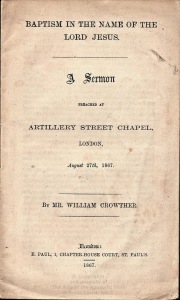
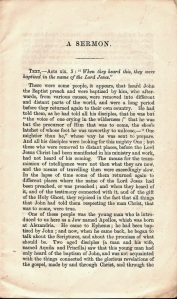
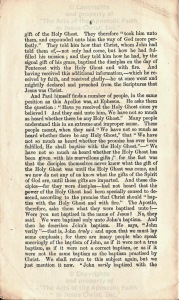
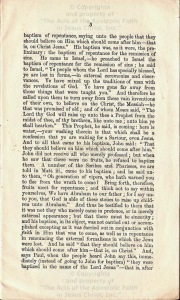
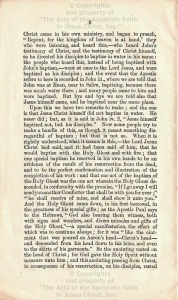
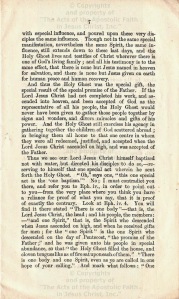

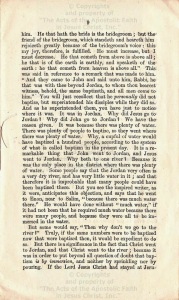
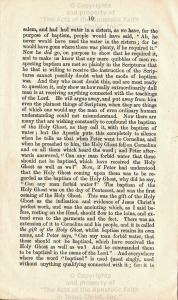
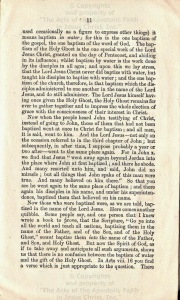
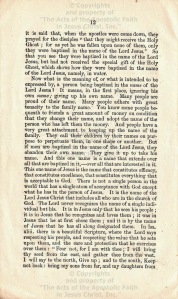
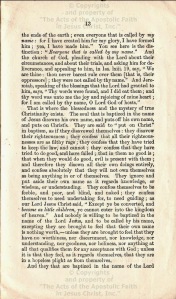
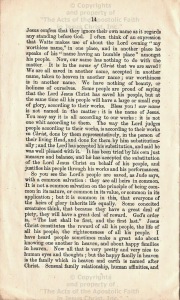
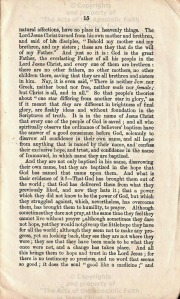

Originally posted on https://thepillarandgroundoftruth.blogspot.com/2013/11/baptism-in-name-of-lord-jesus-william.html
Here are some more pictures of pamphlets written by Oneness Pentecostal / Apostolic writers, which I took at my Grandmother’s home in South Bend, IN several years ago.
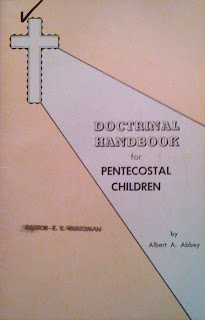
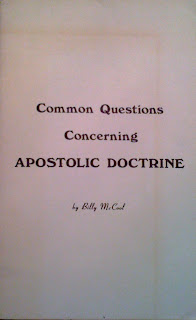
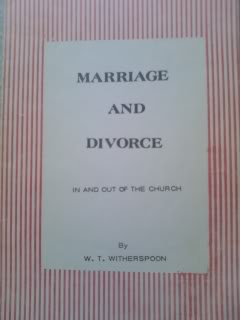
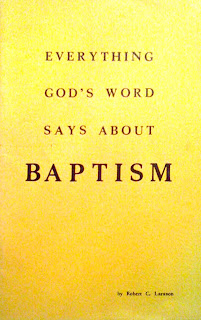


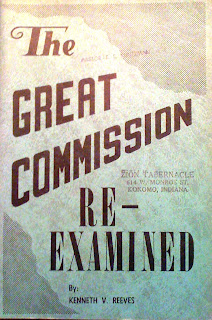
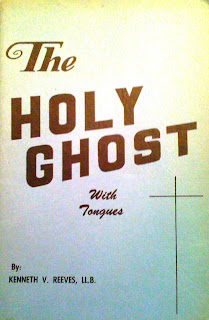
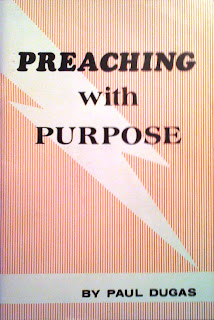
I read recently that if you want to change your generation you need to preach, but if you want to change future generations then write. I’m thankful these authors wrote these pamphlets.
Originally posted on https://thepillarandgroundoftruth.blogspot.com/2012/12/more-pamphlets-from-apostolic-writers.html
The following is derived from a symposium paper co-authored by Stewart A. Bertram and myself in the Spring of 2005 and presented to Parkersburg Bible College (Parkersburg, WV) during their annual colloquium.
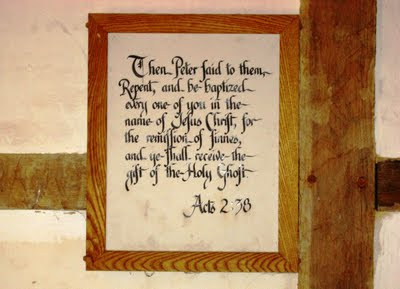
History undeniably records various elements of distinctly Orthodox Apostolic doctrine in North America as early as 1677, which was only 70 years after the first permanent settlement was established in Jamestown.[1] What we will attempt to show is a chronological outline of these various apostolic doctrines and practices as they appear in the index of North American history. While many will view this as a restoration of Apostolic Pentecostal experience we maintain that it actually proves the continued existence and growth of the orthodox teaching of the book of Acts. We further assert that there have always been pockets of true believers in every century following and obeying the true message of the New Birth. Some examples record partial alignment with the Apostles’ doctrine, the following is a list of some of those instances:
- Society of Friends (Quakers) – “…our tongues loosed and our mouths opened, and we spake with new tongues as the Lord gave utterance, and as His Spirit led us.”[2]
- John Wesley (1703-1791) – “What so impressed and encouraged John Wesley and his followers, what so shocked, startled, and bewildered his contemporaries, is no mystery to the modern psychologist, to whom it is known as glossolalia…”[3]
- Charles G. Finney (1783-1875) – “I received a mighty baptism in the Holy Ghost…No words can express the wonderful love that was shed abroad in my heart. I wept aloud with joy and love; and I do not know but I should say, I literally bellowed out the unutterable gushings of my heart.”[4]
- John Miller – a Presbyterian minister wrote Is God a Trinity in 1876 and “believed that the doctrine of the trinity was not biblical and that it greatly hindered the Church….He emphatically declared the full deity of Jesus Christ.”[5]
- D. L. Moody (1837-1899) – According to R. A. Torrey, Moody’s friend and associate, he once witnessed Moody walk to the pulpit to preach but instead of addressing the crowd in English he began to speak in another language. This occurred one more time before he was able to gain control and preach to the audience, but “only after much prayer and praise.”[6]
- Lowell, Ohio (1835) – a group of Camisards and/or French Huguenots establish an Orthodox Apostolic Acts 2:38 believing Church, but article IX of the church constitution changes the baptismal formula from Jesus’ name to the trinitarian formula in 1847. In 1980 Dr. Nelson preaches the Apostolic message to the congregation and they convert back to the orthodox message of Acts 2:38.[7]
- Dan Huntington (1850) – baptized people in Boston, Massachusetts in Jesus’ name.[8]
- Canada (1854) – “There was an organization of Acts 2:38 clergymen in Canada.”[9]
- America (1865) – More than 160,000 Americans spoke in tongues.[10] [11]
- Alvin E. Velie (1884-1904) – all pre-1900:[12]
1) Wrote the book Safety First Acts 2:38.
2) Baptized over 1,500 people in Jesus’ name in Wisconsin.
3) Preached in various locations along the Mississippi River.
4) Preached a considerable amount of the time in the Salvation Army.
- Charles Fox Parham – “the first leader in the twentieth century Pentecostal movement, began to administer water baptism in Jesus’ name, although he apparently did not link this practice with an explicit denial of trinitarianism.”[13] Parham also “formulated the basic Pentecostal doctrine of ‘initial evidence’ after a student in his Bethel Bible School, Agnes Ozman, experienced glossolalia in January, 1901.”[14]
[1] Weisser, Thomas. After the Way Called Heresy. 1981.
[2] Bresson, Bernard L. Studies in Ecstasy. New York: Vintage Press. 1966. p. 48-52.
[3] Bowen, Marjorie. Wrestling Jacob: a study of the life of John Wesley. London: Watts & Co. 1948.
[4] Finney, Charles G. Memoirs of Charles G. Finney, being an Autobiography. New York.
1876.
[5] Bernard, David K. The Oneness of God. Hazelwood: Pentecostal Publishing House. 1993. 31 May 2005.
[6] Darbee, Lennard. Tongues: the Dyanmite of God.
[7] Nelson, Joseph. Church History. Parkersburg Bible College. Lecture given and Church Constitution shown to class on 18 November 2002.
[8] Synan, V. Aspects of Pentecostal-Charismatic Origins, NJ: Logos. 1975.
[9] Arnold, Marvin M. Apostolic History Outline. Arno Publications, Inc. 1985.
[10]Ibid.
[11] Blunt, John H. Dictionary Of Sects, Heresies, Ecclesiastical Parties, And Schools Of Religious Thought. Ann Arbor: Gryphon Books. 1971.
[12] Nelson, Joseph. Church History. Parkersburg Bible College. Lecture on 18 November 2002.
[13] Bernard, David K. The Oneness of God. Hazelwood: Pentecostal Publishing House. 1993. 31 May 2005.
[14] Synan, V. Pentecostalism. 16 April 2005. http://mb-soft.com/believe/txc/pentecos.htm.
[Originally posted on 17 August 2011 on https://thepillarandgroundoftruth.blogspot.com/2011/08/pre-1900-examples-of-apostolic-doctrine.html]
The Promise
Text: John 14:15-26, “(15) If ye love me, keep my commandments. (16) And I will pray the Father, and he shall give you another Comforter, that he may abide with you for ever; (17) Even the Spirit of truth; whom the world cannot receive, because it seeth him not, neither knoweth him: but ye know him; for he dwelleth with you, and shall be in you. (18) I will not leave you comfortless: I will come to you. (19) Yet a little while, and the world seeth me no more; but ye see me: because I live, ye shall live also. (20) At that day ye shall know that I am in my Father, and ye in me, and I in you. (21) He that hath my commandments, and keepeth them, he it is that loveth me: and he that loveth me shall be loved of my Father, and I will love him, and will manifest myself to him. (22) Judas saith unto him, not Iscariot, Lord, how is it that thou wilt manifest thyself unto us, and not unto the world? (23) Jesus answered and said unto him, If a man love me, he will keep my words: and my Father will love him, and we will come unto him, and make our abode with him. (24) He that loveth me not keepeth not my sayings: and the word which ye hear is not mine, but the Father’s which sent me. (25) These things have I spoken unto you, being yet present with you. (26) But the Comforter, which is the Holy Ghost, whom the Father will send in my name, he shall teach you all things, and bring all things to your remembrance, whatsoever I have said unto you.”
Isaiah 55:10-11, “For as the rain cometh down, and the snow from heaven, and returneth not thither, but watereth the earth, and maketh it bring forth and bud, that it may give seed to the sower, and bread to the eater: So shall my word be that goeth forth out of my mouth: it shall not return unto me void, but it shall accomplish that which I please, and it shall prosper in the thing whereto I sent it.”
God’s Word is forever settled in Heaven and will accomplish its goal. God generally offers two types of promise in the Bible:
- Unconditional – The promises to Abraham, Isaac, and Jacob did not depend on any future action on their part because they were unconditional and would come to pass regardless of anything that these men did or didn’t do:
- Joel 2:28-29, “And it shall come to pass afterward, that I will pour out my spirit upon all flesh; and your sons and your daughters shall prophesy, your old men shall dream dreams, your young men shall see visions: And also upon the servants and upon the handmaids in those days will I pour out my spirit.”
- Isaiah 28:11-12, “For with stammering lips and another tongue will he speak to this people. To whom he said, This is the rest wherewith ye may cause the weary to rest; and this is the refreshing: yet they would not hear.”
- Conditional – The Bible contains “if…then” statements. These are requirements that you must meet to receive the promise. They represent future acts that must be obeyed to receive the full promise:
- 2 Chronicles 7:14, “If my people, which are called by my name, shall humble themselves, and pray, and seek my face, and turn from their wicked ways; then will I hear from heaven, and will forgive their sin, and will heal their land.
- Acts 2:37-39, “Now when they heard this, they were pricked in their heart, and said unto Peter and to the rest of the apostles, Men and brethren, what shall we do? Then Peter said unto them, Repent, and be baptized every one of you in the name of Jesus Christ for the remission of sins, and ye shall receive the gift of the Holy Ghost. For the promise is unto you, and to your children, and to all that are afar off, even as many as the Lord our God shall call.”
Often the question is asked, “Why Tongues?”[1]
- God is not accountable to us for what He chooses to so. He is Sovereign, Creator, Sustainer, Redeemer, Savior…
- Tongues is an initial external sign that must be followed by the fruit of the Spirit.
- Gal. 5:22-23, “…the fruit of the Spirit is love, joy, peace, longsuffering, gentleness, goodness, faith, Meekness, temperance…”
- John 3:8, “The wind bloweth where it listeth, and thou hearest the sound thereof, but canst not tell whence it cometh, and whither it goeth: so is every one that is born of the Spirit.”
- It is the consistent pattern of evidence established by God as essential in the New Birth:
- 1 Corinthians 12:13, “For by one Spirit are we all baptized into one body, whether we be Jews or Gentiles, whether we be bond or free; and have been all made to drink into one Spirit.”
- The tongue is the most unruly member of the body and when you receive the Holy Ghost speaking in tongues you are allowing God to control the most expressive part of your personality. Man’s expression of emotion, intelligence, and communication is articulated through the tongue.
It’s just for the Apostles and Early Church:
Irenaeus (died 202) ~ “In like manner we do also hear many brethren in the Church, who possess prophetic gifts, and who through the Spirit speak all kinds of languages, and bring to light for the general benefit the hidden things of men, and declare the mysteries of God.”[2]
Hildegard of Bingen (1098-1179) ~ “sang in unknown words with such facility and winsomeness that her utterances were known as ‘concerts in the Spirit’.”[3]
The Waldenses (c. 1217) ~ these followers of Peter Waldo believed in visions and prophecies.[4] Both healing and speaking in tongues were manifested among these heavily persecuted Christians.[5]
Early Quakers ~ “We received often the pouring down of the Spirit upon us, and our hearts were made glad and our tongues loosed and our mouths opened, and we spake with new tongues as the Lord gave utterance, and as His Spirit led us.”[6]
John Wesley ~ People in Wesley’s meetings would be filled with the Holy Ghost while he preached.[7]
Thomas Walsh (one of Wesley’s foremost preachers) made this entry in his diary; “This morning the Lord gave me a language that I knew not of, raising my soul to Him in a wonderful manner.”[8]
In England (1830) there was a revival under Edward Irving where gifts of the Spirit were manifested. One member of the congregations writes: “The moment I am visited with the Spirit, and carried out to God in a tongue which I know not… I am more conscious than ever of the presence of God. He and He alone is in my soul. I am filled with some form of the mind of God, be it joy or grief, desire, love, pity, compassion, or indignation; and I am made to utter it in words which are full of power over my spirit, but not being accessible to my understanding, my devotion is not interrupted by association of suggestions from the visible or intellectual world: I feel myself, as it were, shut in with God in His pavilion, and hidden close from the invasions of the world, the devil, and the flesh.”[9]
Charles G. Finney ~ “I received a mighty baptism in the Holy Ghost…No words can express the wonderful love that was shed abroad in my heart. I wept aloud with joy and love; and I do not know but I should say, I literally bellowed out the unutterable gushings of my heart.”[10]
D. L. Moody ~ “One the following Sunday night, when I got to the rooms of the Y.M.C.A. I found the meetings on fire. The young men were speaking in tongues and prophesying. What on earth did it all mean? Only that Moody had been addressing them that afternoon.”[11] At a meeting in Los Angeles, Dr. R.A. Torrey told of a service in London where Moody took the pulpit to preach and instead broke into another language. He tried again, with similar results. The third time, after prayer and praise, he was able to preach his message.[12]
Charles H. Spurgeon ~ a British preacher told how Spurgeon once asked his audience to forgive him that when he got especially happy in the Lord, “I break forth into a kind of gibberish which I do not myself understand.”[13]
How Do I Receive this Phenomenon of the Holy Ghost?[14]
- Prepare your heart by obeying Acts 2:38 (Repent).
- Understand that God wants you to receive His gift as much as you want it…just ask Him for the Holy Ghost: “If ye then, being evil, know how to give good gifts unto your children: how much more shall your heavenly Father give the Holy Spirit to them that ask him?” (Luke 11:13)
- You must be hungry to receive His Spirit.
- Matthew 5:6, “Blessed are they which do hunger and thirst after righteousness: for they shall be filled.”
- James 4:8, “Draw nigh to God, and he will draw nigh to you. Cleanse your hands, ye sinners; and purify your hearts, ye double minded.”
- Expect to receive: “And when Paul had laid his hands upon them, the Holy Ghost came on them; and they spake with tongues, and prophesied” (Acts 19:6).
- Believe to receive: John 7:38-39, “He that believeth on me, as the scripture hath said, out of his belly shall flow rivers of living water. (But this spake he of the Spirit, which they that believe on him should receive: for the Holy Ghost was not yet given; because that Jesus was not yet glorified.)”
- Relax!!
Promise of Christ’s Return:
1 Corinthians 15:51-56, “51 Behold, I shew you a mystery; We shall not all sleep, but we shall all be changed, 52 In a moment, in the twinkling of an eye, at the last trump: for the trumpet shall sound, and the dead shall be raised incorruptible, and we shall be changed. 53 For this corruptible must put on incorruption, and this mortal must put on immortality. 54 So when this corruptible shall have put on incorruption, and this mortal shall have put on immortality, then shall be brought to pass the saying that is written, Death is swallowed up in victory. 55 O death, where is thy sting? O grave, where is thy victory? 56 The sting of death is sin; and the strength of sin is the law. 57 But thanks be to God, which giveth us the victory through our Lord Jesus Christ.”
[1] “Speaking In Tongues.” Various Authors. Retrieved 5-15-2005 from http://altupc.com/articles/tongues1.htm.
[2] Against Heresies, V,6,1, Ibid., vol 1, p. 531
[3] George H. Williams and Edith Waldvogel, “A History of Speaking in Tongues and Related Gifts,” in The Charismatic Movement, ed. by Michael P. Hamilton, p. 70
[4] R. Kissack, “Waldenses,” The New International Dictionary of the Christian Church, ed. by J.D. Douglas, revised edition, p. 1026
[5] Gordon F. Atter, The Third Force, p. 13
[6] Bresson, Studies in Ecstacy, pp. 48-52
[7] http://www.holyspiritinfo.net/ch_hist.htm
[8] Entry of March 8, 1750, quoted by Frodsham, With Signs following, p. 232
[9] A.L. Drummond, Edward Irving and His Circle, pp. 161-162
[10] Charles G. Finney, Autobiography, p. 20
[11] Boyd, Robert, The Lives and Labours of Moody and Sankey, p. 47
[12] Lennard Darbee, Tongues: The Dynamite of God, p. 24.
[13] Ibid. p.24
[14] Principles of Doctrine: Lesson 11. “Holy Spirit Baptism.” Parkersburg Bible College.
The Promise | 15 May 2005
